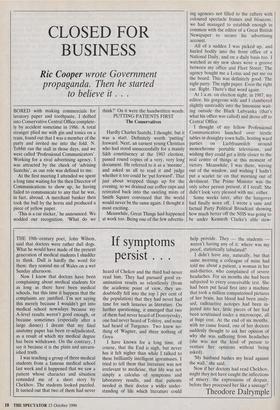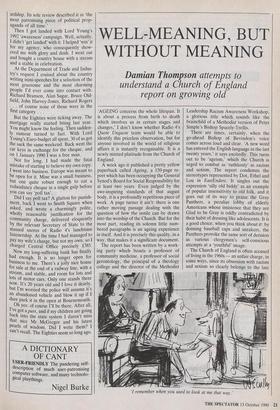CLOSED FOR BUSINESS
Ric Cooper wrote Government
propaganda. Then he started to believe it . . .
BORED with making commercials for lavatory paper and toothpaste, I drifted into Conservative Central Office complete- ly by accident sometime in 1986. A total stranger plied me with gin and tonics on a train, found out that I was a member of the party and invited me into the fold. N. Tebbit ran the stall in those days, and we were called 'Professional Communicators'. Working for a rival advertising agency, I was attracted by the cheek of 'advising Saatchis', as our role was defined to me.
At the first meeting I attended we spent a long time waiting for the then Director of Communications to show up, he having failed to communicate to any that he was, in fact, abroad. A merchant banker then took the bull by the horns and produced a piece of yellow paper.
`This is a car sticker,' he announced. We nodded our recognition. 'What do we think?' On it were the handwritten words: PUTTING PATIENTS FIRST The Conservatives Hardly Charles Saatchi, I thought, but it was a start. Definitely worth 'putting' forward. Next, an earnest young Christian who had stood unsuccessfully for a mainly Sikh constituency at the 1983 election, passed round copies of a very, very long document. He referred to it as a `meemo', and asked us all to read it and judge whether it too could be 'put forward'. That just about wrapped things up for the evening, so we drained our coffee cups and retreated back into the swirling mists of Smith Square convinced that the world would never be the same again. I thought it most exciting.
Meanwhile, Great Things had happened at work too. Being one of the few advertis- ing agencies not filled to the rafters with coloured spectacle frames and blousons, we had managed to establish enough in common with the editor of a Great British Newspaper to secure his advertising account.
All of a sudden I was picked up, and hurled bodily into the front office of a National Daily, and on a daily basis too. I watched as my new shoes wore a groove between my office and Fleet Street. The agency bought me a Lotus and put me on the board. This was definitely good. The right party. The right paper. Even the right car. Right. There's that word again.
At 1 a.m. on election night, in 1987, my editor, his gorgeous wife and I clambered slightly unsteadily into the limousine wait- ing outside the Black Lubyanka (that's what his office was called) and drove off to Central Office.
I thought of my fellow Professional Communicators hunched over trestle tables in draughty town halls, hosting ward parties on Liebfraumilch around monochrome portable teleVisions, and wishing they could get a little closer to the real centre of things at this moment of victory. Meanwhile, I was there, waving out of the window, and wishing I hadn't put a scarlet tie on that morning out of devilment. The Prime Minister was the only sober person present, if I recall. She didn't look very pleased with me, either.
Some weeks later, after the hangover had finally worn off, I wrote a sane and factual Party Political Broadcast showing how much better off the NHS was going to be under Kenneth Clarke's able stew- ardship. Its sole review described it as 'the most patronising piece of political prop- aganda of all time.'
Then I got landed with Lord Young's 1992 'awareness' campaign. Well, actually, I didn't 'get landed' with it: I helped 'win' it for my agency, who consequently show- ered me with glory and dosh. I went out and bought a country house with a stream and a stable in celebration.
At the Department of Trade and Indus- try's request I cruised about the country writing mini-speeches for a selection of the most gruesome and the most charming people I'd ever come into contact with: Richard Branson, Alan Sugar, Bruce Old- field, John Harvey-Jones, Richard Rogers • • . of course none of those were in the first category . .
But the Eighties were ticking away. The mortgage really started biting last year. You might know the feeling. Then sudden- ly rumour turned to fact. With Lord Young's Euro-budget all spent, 30 of us got the sack the same weekend. Back went the car keys in exchange for the cheque, and on 1 January 1990 I was a free man. Not for long. I had made the fatal mistake of starting to believe my own copy. I went into business. Europe was meant to be open for it. Mine was a small business, but one quite robust enough to eat a redundancy cheque in a single gulp before you can say 'poll tax'. Did I say poll tax? A glutton for punish- ment, back I went to Smith Square when asked, and wrote a charmingly polite, wholly reasonable justification for the community charge, delivered eloquently by the relevant Secretary of State to the massed snores of Radio 4's lunchtime listenership. At the time I had managed to pay my wife's charge, but not my own, so I charged Central Office precisely £385.
Now my long-suffering bank has finally had enough. It is no longer open for business to me. There's a jolly nice house for sale at the end of a railway line, with a stream, and stable, and room for lots and lots of motor cars. Only one stands there now. It's 20 years old and I love it dearly, but I'm worried the police will assume it's an abandoned vehicle and blow it up if I dare park it in the open at Bournemouth. Oh yes: of course I'll be there. After all, I've got a pass, and if my children are going back into the state system I daren't miss that nice Mr McGregor and his latest pearls of wisdom. Did I write them? 1 can't recall. The Eighties seem so long ago.



























































 Previous page
Previous page